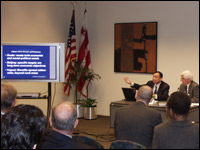Registration
You will receive an email confirming your registration.
IMGXYZ854IMGZYXThe China Program at Carnegie Endowment hosted a seminar entitled “China’s ‘New Village’ Strategy – Actual Progress and National Impact” on January 31, 2008, to evaluate the latest agriculture policy from Chinese government. Moderated by Senior Associate Albert Keidel, the event featured guest speaker Hu Binliang, senior research fellow at China Academy of Social Sciences.
Keidel opened the seminar with a brief remark on the latest inflation crisis in China. He considered the continuous rise of Chinese CPI over the past couple months as an inevitable result of shortage in agriculture supply, which has been deteriorated even further by the devastating snow storm in southwest China. Keidel therefore emphasized the importance of New Village Strategy (NVS) and how it would contribute to the smooth development of Chinese agriculture sector.
Hu first gave a brief background on NVS. With the literal meaning of “construction of new socialist countryside,” the Chinese government officially introduced NVS in 2005 as a part of the current five years plan. It was also created amid the grand policy paradigm of 16th Party Congress, which summarized as “integrating urban and rural economic social development.” NVS obviously represents a bold attempt by the Chinese government to reduce regional income disparity and the increasing inequalities between urban and rural areas. Its features the improvement of social infrastructure in country side, which relates to public health, education, and social security, and incentive polices such as subsidies that encourage productivity among farmers. Over the past year, Beijing has devoted extensive commitment to promote this initiative by, for example, launching a large scale training program that instructs county and municipal official national-wide on specific details of NVS.
However, Hu pointed out that there are still plenty of challenges lay ahead for the government. Effective implementation of NVS requires strong leadership with steadfast resolve, democratic management, and most importantly a reform on the fiscal structure so that policies can have the adequate financial support. Hu concluded the presentation by emphasizing the critical role NVS occupies in future development of China, because agriculture sector has always been and will continue be the base of Chinese economy.
This summary was prepared by Wayne Chen, Junior Fellow in the China Program.
